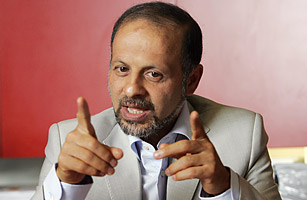
Akbar Ganji, a controversial and outspoken journalist, is a standard bearer of resistance for many of Iran's reformists. He was a member of the Revolutionary Guard before he became disenchanted: "I saw a fascism and political tyranny emerging in Iran. Anyone who asked questions was branded 'antirevolutionary' and 'against Iran.' " Ganji embarked on an investigation of a series of murders that became known as "the chain murders of Iran." The result was his most famous work, a string of essays alleging that senior officials were behind the killings. The accusation led to his arrest in 2000, and he spent the next six years in prison. While in confinement he managed to smuggle out texts he had written, most notably a political manifesto, laying out the basis of his proposal for a fully fledged Iranian democratic republic. He has been a well-known critic of the Iraq war, arguing, "You cannot bring democracy to a country by attacking it."